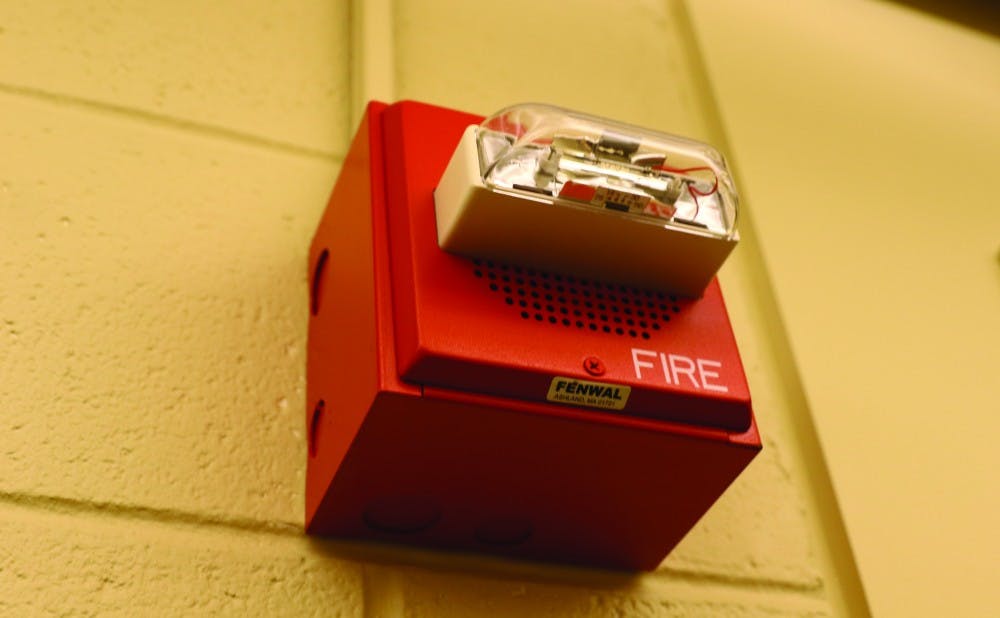Students on East Campus have recently voiced their displeasure about numerous false fire alarm activations.
Although the Fire and Life Safety Division of the Occupational and Environmental Safety Office declined to provide the number of false activations by individuals on East Campus, Greg Andino, a safety and health specialist assigned to East Campus, said that the total number of fire alarm activations since move-in Aug. 18 was 17 as of Friday.
Among the most vocal residents about false alarms on social media outlets such as Yik Yak have been students living in Randolph and Blackwell residence halls. Randolph alone has experienced four fire alarm activations—a drill, a false alarm, a legitimate alarm and an alarm accidentally set off in repairing the damage done by a smoking dryer, students said. Public knowledge of who activated the alarms remains speculative, as many of the residents in Randolph and Blackwell know little about the false alarms other than information gleaned from rumors among fellow freshmen and social media platforms.
“All this stuff was on Yik Yak about people pulling the fire alarms in different dorms so we all just assumed that’s what happened,” freshman Hunter McGhee, a Randolph resident, said of the false alarm in his residence hall.
The main concern among fire officials and administrators with the number of alarm activations is about the desensitizing effects unnecessary activations can have on students.
Students in a residence hall like Randolph may feel inclined to disregard future alerts even though responsiveness to fire alarms is still vital, Lisa Beth Bergene, associate dean for East Campus, wrote in an email.
“The greatest concern is that when a real fire happens and the alarm sounds, people will assume it is another false alarm and stay in the building,” Bergene wrote. “Although infrequent, we have real emergencies every year that do require complete evacuation.”
Several students in Randolph and Blackwell speculated that the perpetrator of the false alarms is a Giles resident.
“I heard during when the fire drill was pulled [in Blackwell] that it was a group of kids from Giles... I don’t really know,” explained freshman Will Graham, a Blackwell resident. “I have no way of knowing and I think no one really knows except for the people who did it and the people who saw it happen.”
Giles residents expressed skepticism about the suggestion that students in their residence hall could be responsible.
Carly Miner—a Giles resident—said controversy about past misbehavior in Giles has led people to blame her dorm for acts like the activation of false alarms around campus. She noted that she questions the validity of such claims.
In addition to desensitizing students, false alarms also pose a risk to the fire department, Andino said.
“You’re also placing the fire department at risk because they have to make another run, you know they have to come to the building as though it’s a real fire and they don’t know that until they get there,” he said.
Attempts to tamper with fire alarms carry substantial penalties for students.
Bergene explained that such a violation would result in a meeting with the Office of Student Conduct and could lead to a loss of housing license, additional sanctions and possibly even a citation—which could impede admission to medical school, law school and certain professions such as teaching.
“[False activation] is a misdemeanor offense,” explained Edward Reid, assistant chief and fire marshal for the Durham Fire Department. “If I knew that somebody did it, I would deal with it on the criminal side.”
Since some of the activations in Blackwell and Randolph occurred as late as 3 a.m., many students who were impacted said the exercise was a waste of the University’s resources.
“It was so annoying,” Graham said. “Everyone was really frustrated by it.”
Correction: This story was updated to note that activations, not necessarily drills, have occurred as late as 3 a.m. The Chronicle regrets the error.
Get The Chronicle straight to your inbox
Signup for our weekly newsletter. Cancel at any time.

